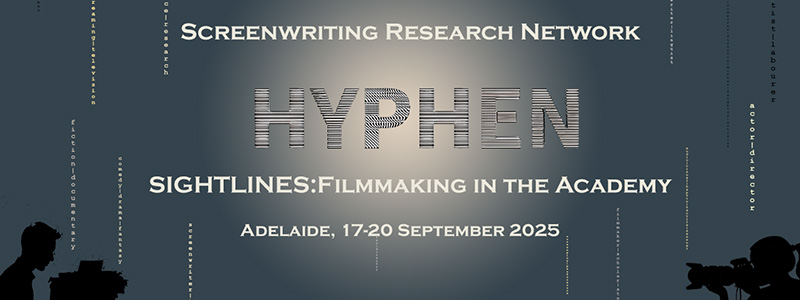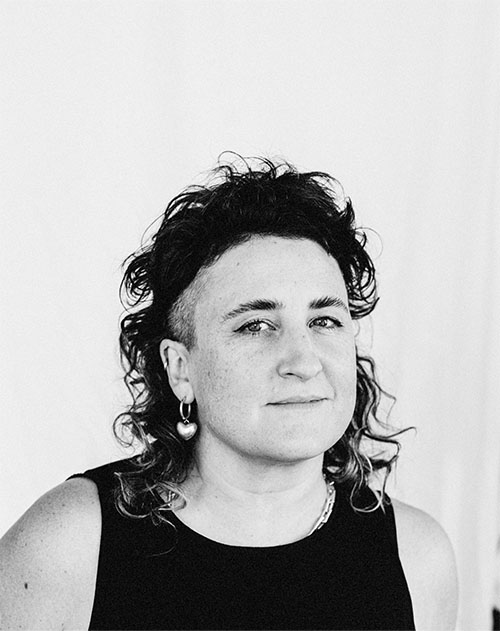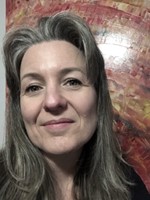Festival-Symposium

Event details
17-20 September 2025
Adelaide
The theme for the conference-festival is Hyphen. The between. The connected. The hybrid. What does the hyphen mean to you? What does it mean for practice? How does it appear in industry? What are the theoretical implications?
Since 2006 the Screenwriting Research Network has hosted an annual conference to explore innovative approaches and exciting research into the history, theory, practice and teaching of screenwriting. This conference has travelled the world. Meanwhile, since 2014, Sightlines: Filmmaking in the Academy, a symposium/festival, has provided a forum to showcase and discuss screen-based ‘non-traditional’ research outputs. In 2025 we bring these two important communities and events together to explore crossovers and connections between theory, practice and education.
In this conference-festival we embrace a range of submissions that reflect the outputs of scholars, reflective practitioners, and creative-practice researchers interested in screenwriting and screen production research and showcase the full range of screenwriting and screen production that occurs within and between the higher education sector and industry, and across a breadth of platforms and methodologies.
Sightlines is hosted by the Creative People, Products and Places Research Centre (CP3) and the Australian Screen Production, Education and Research Association (ASPERA).
Session information
-
Program
Spanning four days in the heart of Adelaide, Hyphen brings together the Screenwriting Research Network and Sightlines: Filmmaking in the Academy for the first time.
With keynotes, screenings, panels, and creative works, the program invites participants to explore the hyphen.
-
Keynote Speakers
Hear from leading thinkers and creators whose work embodies the “hyphen”- bridging disciplines, practices, and perspectives in screenwriting and screen-based research. Our keynote speakers will provoke, inspire, and challenge how we understand the spaces between.
Sophie Hyde
Wednesday, 17 September (The Mercury Cinema)

Acclaimed Australian filmmaker Sophie Hyde will open the combined Screenwriting Research Network and Sightlines: Filmmaking in the Academy conference-festival with a keynote reflecting on a career built at the intersections of roles. As a writer, director, producer and collaborator, Hyde moves fluidly between disciplines to create work that is both personal and deeply collaborative. She will discuss her own writing practice, her approach to working with other screenwriters, and the ways in which collaboration shapes the life of a film from its first draft to final cut. Olivia Colman, who stars in Hyde’s latest feature, has described her as “a proper actor’s director” who understands that actors “need to feel trusted and safe” to do their best work.
Ahead of its Australian premiere as the opening film of the Adelaide Film Festival in October, Hyde will use her most recent film, Jimpa, as a case study in autobiographical storytelling and creative partnership. Written by Hyde and long‑time collaborator Matthew Cormack and directed by Hyde, Jimpa draws from Hyde’s own life to tell the story of a mother and child whose journey to visit the child’s gay grandfather reshapes their understanding of family and identity. The film offers an intimate example of how a director can work closely with another writer to translate lived experience into narrative while maintaining space for performance, interpretation and audience connection.
Launching against the backdrop of a global rollback of trans and queer rights, particularly in the United States, Jimpa had its world premiere at Sundance this year before opening two of the country’s most prominent queer film festivals, NewFest in New York and Frameline in San Francisco. In this climate of heightened political tension, the film resonates as both personal testament and political act. Hyde will reflect on how occupying the space between roles, the hyphen, allows her to navigate complex creative and cultural terrain, and how screenwriting itself can be a form of resistance and renewal.
BIO
Sophie Hyde is an award-winning South Australian filmmaker known for 52 Tuesdays, Animals and Good Luck to You, Leo Grande. A co-founder of Closer Productions and Adelaide Film Festival Patron, her work explores identity and unconventional relationships with formal and emotional boldness.
Christy Dena
Between Now and Us: Story Design for Narrative Change in Screenwriting
Saturday, 20 September (UniSA, Bradley Forum)
Business as usual won’t save the day, same with stories as usual. In 2014, in This Changes Everything, activist, filmmaker and author Naomi Klein said that addressing the climate challenge is not simply about spending a lot of money and changing a lot of policies, ‘it’s that we need to think differently, radically different, for those changes to be remotely possible’. Activists, scientists, politicians, and everyday folk are making those changes. According to Yale’s 2024 report on (American) attitudes towards climate change, the majority of people are concerned and motivated, and the numbers keep rising, while only a small percentage of people are against it. Yet, “refusing the call” is still touted in screenwriting as the standard way characters should respond to change. Story design orthodoxy is out of step with the times.
Pro-Change Storytelling is a craft intervention for creativity, scholarship, and social good. It expands the conventional arc to overtly include the creatives and characters who view change as natural, and adapt in regenerative ways for themselves and their communities. While present in characters and audiences, it is underrepresented and even omitted from screenwriting manuals, articles, and talks. This oversight limits the creative scope of screenwriters and leads non-experts in corporate, educational, and activist contexts to apply designs that aren’t aligned with their message. It also enables overrepresentations of change that reflect and amplify a world most of us want less of: a world where people, communities, and states are forced to change, and change within the bounds of an expiring status quo.
There are plenty of folks who reach for a new kind of change, though. Pro-change storytelling resonates personally with plenty of screenwriters and their audiences, and it fits better with their characters and themes. As many of you have already signalled, we just need to emancipate ourselves from the great creative dampening brought about by screenwriting orthodoxy. Then our stories will more readily bridge the one-now with the many-nows and the many-possible. If we take producer and script editor John Yorke (2020 [2013]) at his word, then ‘[c]hange is the bedrock of life and consequently the bedrock of narrative’. We just need to remember that rocks — and the entire planet — change, too.
BIO
Christy Dena is a narrative design activist, storymaker, educator, and researcher who is living and making for a more kind, just, and creative world. She is a writer, designer, and director of multi-artform and interactive projects whose work spans installations, apps, live games, tabletop, ARGs, VR, films, theatre, and TV. Christy runs her own studio, Universe Creation 101, and has won National Writers’ Guild and State Premier’s Prize awards for her original interactive writing. Her interactive projects have been exhibited across Australia, New York, and Los Angeles.
-
Location
The sessions will take place across two key venues in the Adelaide CBD, UniSA’s Bradley Forum on Level 5 of the Hawke Building and the historic Mercury Cinema. The venues are centrally located and easily accessible on foot.
Bob Hawke Building - UniSA City West Campus
55 North Terrace Adelaide, SA, 5000
Mercury Cinema
13 Morphett Street Adelaide, SA, 5000




